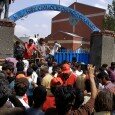By Mirza Khurram Shahzad –
Ex-servicemen are flying out of Pakistan in pursue of financial happiness in restive Gulf States without fearing death on unknown paths
Thousands of Pakistani ex-servicemen have flown out to Bahrain to work as security guards amidst the growing sectarian unrest in the Gulf state and several of them have been killed and injured during the clashes between the violent protesters and the Bahrain’s Royal security forces.
The Bahrini rulers are recruiting Pakistan’s retired military soldiers to quell the violent protests by the majority Shia community against the unpopular minority Sunni Royal family government.
According to reports, at least 18 Pakistani nationals have been killed and several others wounded during the sectarian clashes in Bahrain but the organisations working with the ex-soldiers are still sending people over there and the government is officially denying this fact. In the third week of September, a fresh advertisement appeared in a leading Urdu daily offering attractive salary packages for the ex-servicemen for the security duties in Gulf.
But Ministry of Foreign Affairs, and the relevant organisations, involved in the recruitment of the ex-military persons continue concealing the facts.
Expertise to kill uprisings
A retired senior general of Pakistan Army, however has confirmed the reports that Pakistanis are being used to quash the violent protests and there is a reaction against Pakistanis by the general public in Bahrain.
“Up to 5,000 Pakistani guards have gone to Bahrain for security duties against the violent protests by Shias against the Sunni rulers,” the general who was once a spymaster, told Pique on the condition of anonymity. The general said that the recruitment was at peak in Bahrain after the Egypt revolution in 2011, and when the Bahraini government feared a rebellion over there also. “Then there was a backlash against the Pakistani nationals,” he said.
The unrest kicked up every now and then by Bahrain’s majority Shia population, who are resisting the ruling minority Sunni Royal family. Pakistanis, especially the Sunni ex-servicemen, are very popular with the Bahraini rulers because they fight hard in return of lucrative wages that they earn to send back home.
The fabulous salaries
A resident of Attock district, who is serving as a soldier in the Bahraini Royal forces in Manama, says the number of Pakistanis recruited in Bahrain’s security forces was much more than the reported in Pakistan.
“At least 8,000 Pakistanis are working in Bahrain’s police and Royal forces. I was recruited around two years ago,” he told Piqu‘ in a communication from Manama while requesting anonymity.
“We all have come here to work in the services because we are paid fabulously. We earn around Rs 150,000 a month for just 15 days of work. The job becomes risky when violent protests erupt, but there are risks in Pakistan, too. Here, at least we are earning good money for our families back home; even if we die in another country, so what? We can die in a bomb blast in Pakistan as well. Thousands have already died in such attacks. At least we can send a good amount of money to our children before dying here.”
“In our own country, we will get nothing,” he said.
Death of a soldier
Rawalpindi’s 22-year-old Khawar has been laid to rest in a graveyard, located close to the head office of Khan Research Laboratories, and Islamabad’s Benazir Bhutto International Airport, transiting thousands of poor Pakistanis to the Gulf States in search of a good price for their sweat and blood.
Khawar had died in March in Bahrain while on duty in Bahriani security services. He joined the Bahraini forces because he wanted to fight like a soldier. But he was killed in a bomb blast. The bomb was planted near Bahrain’s capital Manama, targeting his vehicle.
Khawar was one of the thousands of Pakistanis who have been recruited recently by the Bahraini government in their security forces. Khawar’s father was employed in a government office in Manama and his family was settled there too.
So, when he got a chance to become a soldier and earn a lucrative amount of money, he took it. He grabbed the offer with both hands. His Pakistani and Sunni background worked for him and he was recruited. The salary was good – well over Rs100,000 – and the work was not difficult. But then he was killed. Blown up in a bomb blast.
“His father was so upset over his death, he would not say anything about him,” says his cousin Rashid Mehmood. “His family came here to bury him, stayed for a few days and then went back. The incident was so sudden, so shocking that we could not ask his parents about his job. There were questions in our minds such as why did he enlist in the Bahraini security force. Why did he not join the Pakistan Army?”
“My uncle did not want to disclose too much information about his son’s job… we also did not insist. We just condoled and then they left,” Mehmood said.
The Denial
Officials of the two military-related organisations, who have been sending ex-soldiers for these jobs to Bahrain, are trying to conceal the facts. But people privy to the process say that the last batch was recruited in March this year.
“We manage the recruitments and send people over to Bahrain whenever there is a requirement. Currently there is no demand,” said Azhar Iqbal, general manager of Bahria Foundation’s recruitment wing, declining to offer any further comments. “Please approach the Public Relations wing of the Pakistan Navy,” he said.
But a Navy spokesperson said the recruitment office of the Foundation doesn’t officially come under the Pakistan Navy. “They have their own communication wing and they should themselves respond to your queries,” he said.
Colonel Masood, a senior official at the Fauji Foundation’s overseas recruitment wing, refused to comment, saying that he should be approached through proper official channels. “I will not comment on this issue until and unless I know who you are and why you are asking these questions,” he said.
The Foreign Office, the apex government authority dealing with Pakistanis abroad, was also not prepared to provide information about this issue. “Thousands of people go to the Gulf for work. We are not sending people to work for the security forces of other countries. Hence, I am unaware about the issue,” said Tasneem Aslam, the FO spokesperson.































































































